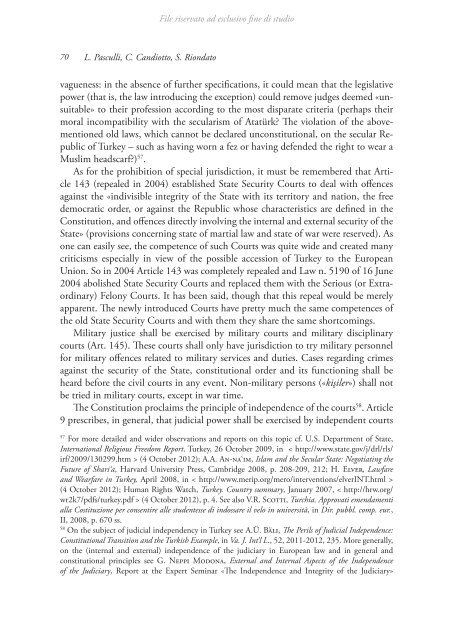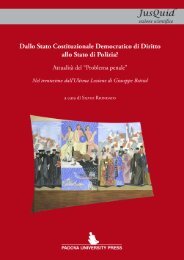il libro - Silvio Riondato
il libro - Silvio Riondato
il libro - Silvio Riondato
You also want an ePaper? Increase the reach of your titles
YUMPU automatically turns print PDFs into web optimized ePapers that Google loves.
70 L. Pasculli, C. Candiotto, S. <strong>Riondato</strong><br />
F<strong>il</strong>e riservato ad esclusivo ne di studio<br />
vagueness: in the absence of further specications, it could mean that the legislative<br />
power (that is, the law introducing the exception) could remove judges deemed «unsuitable»<br />
to their profession according to the most disparate criteria (perhaps their<br />
moral incompatib<strong>il</strong>ity with the secularism of Atatürk? e violation of the abovementioned<br />
old laws, which cannot be declared unconstitutional, on the secular Republic<br />
of Turkey – such as having worn a fez or having defended the right to wear a<br />
Muslim headscarf?) 57 .<br />
As for the prohibition of special jurisdiction, it must be remembered that Article<br />
143 (repealed in 2004) established State Security Courts to deal with oences<br />
against the «indivisible integrity of the State with its territory and nation, the free<br />
democratic order, or against the Republic whose characteristics are dened in the<br />
Constitution, and oences directly involving the internal and external security of the<br />
State» (provisions concerning state of martial law and state of war were reserved). As<br />
one can eas<strong>il</strong>y see, the competence of such Courts was quite wide and created many<br />
criticisms especially in view of the possible accession of Turkey to the European<br />
Union. So in 2004 Article 143 was completely repealed and Law n. 5190 of 16 June<br />
2004 abolished State Security Courts and replaced them with the Serious (or Extraordinary)<br />
Felony Courts. It has been said, though that this repeal would be merely<br />
apparent. e newly introduced Courts have pretty much the same competences of<br />
the old State Security Courts and with them they share the same shortcomings.<br />
M<strong>il</strong>itary justice shall be exercised by m<strong>il</strong>itary courts and m<strong>il</strong>itary disciplinary<br />
courts (Art. 145). ese courts shall only have jurisdiction to try m<strong>il</strong>itary personnel<br />
for m<strong>il</strong>itary oences related to m<strong>il</strong>itary services and duties. Cases regarding crimes<br />
against the security of the State, constitutional order and its functioning shall be<br />
heard before the civ<strong>il</strong> courts in any event. Non-m<strong>il</strong>itary persons («kiş<strong>il</strong>er») shall not<br />
be tried in m<strong>il</strong>itary courts, except in war time.<br />
e Constitution proclaims the principle of independence of the courts 58 . Article<br />
9 prescribes, in general, that judicial power shall be exercised by independent courts<br />
57 For more deta<strong>il</strong>ed and wider observations and reports on this topic cf. U.S. Department of State,<br />
International Religious Freedom Report. Turkey, 26 October 2009, in < http://www.state.gov/j/drl/rls/<br />
irf/2009/130299.htm > (4 October 2012); A.A. An-na‘im, Islam and the Secular State: Negotiating the<br />
Future of Shari‘a, Harvard University Press, Cambridge 2008, p. 208-209, 212; H. Elver, Lawfare<br />
and Wearfare in Turkey, Apr<strong>il</strong> 2008, in < http://www.merip.org/mero/interventions/elverINT.html ><br />
(4 October 2012); Human Rights Watch, Turkey. Country summary, January 2007, < http://hrw.org/<br />
wr2k7/pdfs/turkey.pdf > (4 October 2012), p. 4. See also V.R. Scotti, Turchia. Approvati emendamenti<br />
alla Costituzione per consentire alle studentesse di indossare <strong>il</strong> velo in università, in Dir. pubbl. comp. eur.,<br />
II, 2008, p. 670 ss.<br />
58 On the subject of judicial independency in Turkey see A.Ü. Bäli, e Per<strong>il</strong>s of Judicial Independence:<br />
Constitutional Transition and the Turkish Example, in Va. J. Int’l L., 52, 2011-2012, 235. More generally,<br />
on the (internal and external) independence of the judiciary in European law and in general and<br />
constitutional principles see G. Neppi Modona, External and Internal Aspects of the Independence<br />
of the Judiciary, Report at the Expert Seminar «e Independence and Integrity of the Judiciary»



